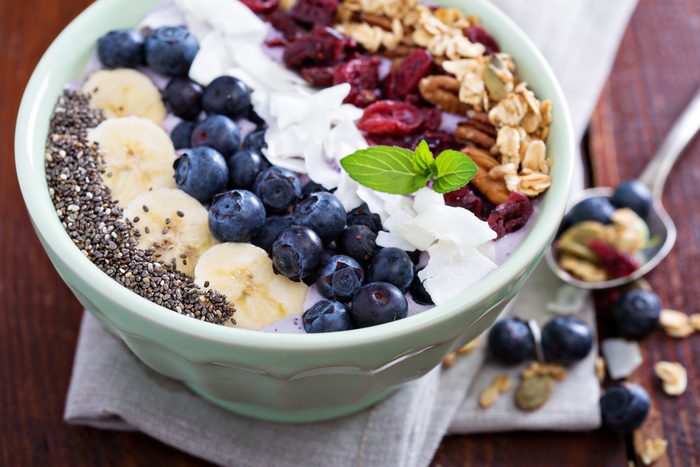
1. You’ll Consume Fewer Calories
Researchers at Vanderbilt University recruited dieters who typically missed breakfast, and put all women on a 1,2000 calories-a-day diet. One group divided calories between lunch and dinner. The second group at those two meals plus breakfast. Twelve weeks later, the breakfast eaters had lost 17 pounds; the women who didn’t eat breakfast had shed 13.
“Wait a minute,” you might say. “Weren’t both groups consuming the same number of calories?” Only in theory, the researchers concluded. The women who ate breakfast were better able to stick to the 1,200-calorie diet, while those who went hungry until lunch were more tempted to cheat a little.
If you pass up breakfast, this study shows, you’re likely to eat more, not less, than if you start the day with a meal. The longer you go without eating, the hungrier you’ll get. And the hungrier you get, the more likely you are to reach for an unhealthy snack. When you greet the day with breakfast, you begin by taming the hungry beast inside and make it easier to keep cravings in check.
Hunger is closely related to blood sugar, which is to the human body what gasoline is to a car: its primary source of fuel. Eating a good breakfast makes sure there is plenty of blood sugar in your bloodstream available for your body to convert into energy. When blood sugar dips, your body responds with food cravings-and for many people, those cravings are for sugar, since sweet foods convert quickly into blood sugar. But this wreaks havoc on your body’s chemistry, particularly your insulin levels, leading to unhealthy eating. Long story short: You want generally stable blood sugar and insulin levels for both your optimum weight and overall health.
The way to achieve that is to eat small amounts frequently. A healthy breakfast not only sets you up for good eating patterns throughout the rest of the day, but immediately takes care of the lower blood sugar level that you have after a night’s sleep.

2. You’ll Strengthen Your Self Control
Psychologists say that levels of two brain chemicals that give us a sense of control-cortisol and adrenaline-peak right after we get up. The confidence they provide may make it easier to stick to our good intentions, such as a healthier diet. These chemicals ebb later in the morning, making it tougher to say no to the doughnuts someone brings into the office-especially if you’re starving because you skipped breakfast.

3. You’ll Keep The Weight Off
Since 1993, researchers at the University of Colorado and the University of Pittsburgh have been gathering data on dieters who lost 30 pounds or more and kept the weight off. This unique project, called the National Weight Control Registry, was designed to find out what it takes to shed pounds permanently.
And guess what? Four out of five participants in the registry-people who have managed to lose and keep off a significant amount of weight-say they eat breakfast every day.

4. You’ll Feel Fuller Longer
Fibre is an important defense against several common health problems. It’s also a key player in a healthy weight-loss diet. Because it’s filling, fibre makes a meal feel more satisfying with fewer calories. One form, called soluble fibre, absorbs water to form gels that slow digestion; foods that are high in this kind of fibre stay with you longer than those without, keeping you from getting hungry.
By slowing down digestion, fibre also helps keep blood sugar steady, which cuts cravings and evens out insulin levels. This has several benefits, including signaling to your body to cut down on the amount of fat it is storing.
In fact, to test the hunger-taming effects of high-fibre foods, scientists at Australia’s University of Sydney compared two seemingly similar breakfasts: a bowl of bran flakes, which are high in fibre, and a bowl of cornflakes, which are not. Volunteers in the bran group reported feeling less hungry later in the morning than those who ate cornflakes.
In a similar experiment, researchers at the New York Obesity Research Center at St. Luke’s-Roosevelt Hospital pitted a sugary, low-fibre breakfast cereal against oatmeal, which is among the highest-fibre cereals you can have. When volunteers ate the sweetened flakes, they tended to eat as much at lunch as if they’re had nothing but a glass of water at breakfast. When they sat down to a bowl of oatmeal, they felt fuller for longer and ate as much as 40 percent less.

5. You’ll Burn More Fat
Non-fat or low-fat dairy products are a terrific low-calorie source of calcium, which you need for three key health reasons: It helps keep bones strong, reins in blood pressure, and recent studies suggest it may lower the risk of colon cancer.
Calcium also seems to change the efficiency of weight-loss. The evidence first showed up in a study designed d to test whether men who added two cups of yogurt to their diet every day would lower their blood pressure. Their readings did drop, and they also lost weight 11 pounds a year, on average.
Another study showed that dieters who ate three to our servings of dairy products daily lost 70 percent more weight in six months than people on the same diet who were not eating dairy. And better still, those in the dairy group also lost more fat from around their middles. The magic ingredient in dairy products seems to be calcium. One two-year study found that women who ate a low-calcium diet gained weight, while women who got plenty of calcium in their diets maintained a steady weight or even lost a few pounds.
Why? Experts have found that getting too little calcium triggers the release of a hormone called calcitrol, which tells the body to store fat. When calcium levels are high, calcitrol levels remain low and your body burns fat instead of storing it.
